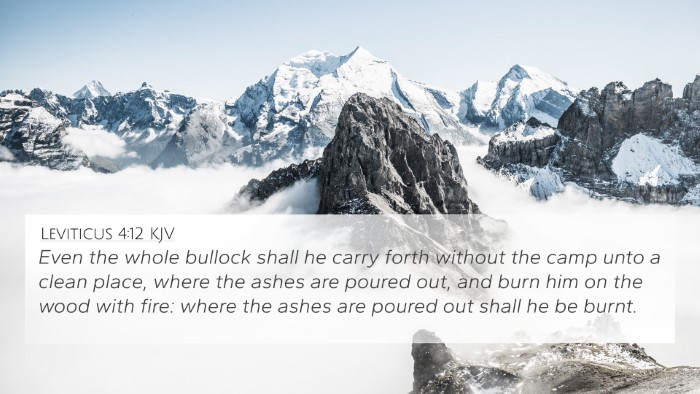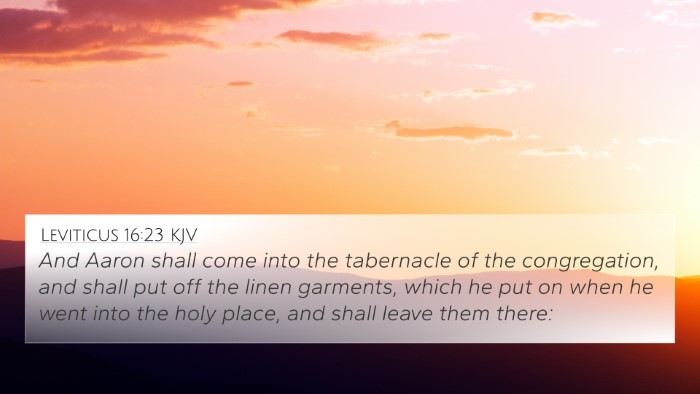Understanding Leviticus 6:11
Verse: Leviticus 6:11 - "And he shall put off his garments, and put on other garments, and carry forth the ashes without the camp unto a clean place."
Summary of Leviticus 6:11
This verse describes the ritual of a priest after a burnt offering is made. The priest must change his garments and carry the ashes outside the camp to a clean place. This act symbolizes purification and the importance of approaching God with holiness.
Meaning and Insights from Public Domain Commentaries
This verse has been analyzed by many prominent theologians and biblical scholars like Matthew Henry, Albert Barnes, and Adam Clarke, each offering unique insights that help deepen our understanding of its significance.
Matthew Henry's Commentary
- Holiness and Purity: Henry emphasizes the need for the priest to change his garments, reflecting the necessity of purity when dealing with sacred offerings. This signifies that one must be clean and renewed to serve God effectively.
- Symbolic Act of Removing Ashes: The act of carrying ashes away represents the removal of the old and defiled, reinforcing the theme of sacrifice and the cleansing power of God in the lives of His people.
Albert Barnes' Notes
- Priestly Duties: Barnes highlights that Leviticus 6:11 illustrates the priest's responsibilities to maintain the ceremonial law. It reflects their service towards God and the community.
- Connection to Christ: He also draws parallels to the New Testament, where Christ fulfills the sacrificial system, representing the ultimate purging of sin.
Adam Clarke's Commentary
- Clean Place: Clarke notes the importance of carrying the ashes to a clean place, illustrating that God desires cleanliness and order in worship and offerings.
- Cultural Context: He adds that this practice would have made sense in the culture of ancient Israel, as cleanliness was essential for community health and divine favor.
Bible Cross-References
Leviticus 6:11 connects with several other verses that enhance its message:
- Exodus 29:14: Reinforces the concept of carrying away the ashes from sacrifices.
- Leviticus 1:16: Details the sacrificial requirements, including what to do with the skins and ashes.
- Hebrews 13:11-13: Connects the Old Testament sacrifices with the sacrifice of Christ, highlighting a spiritual parallel.
- Isaiah 52:11: Calls for God's people to leave the defilement behind, aligning with the theme of purity.
- John 3:30: Illustrates the necessity of diminishing oneself to enhance the glory of God in all actions.
- 1 Peter 2:9: Asserts that believers are called to be a holy priesthood, drawing an analogy to priestly duties.
- 2 Corinthians 6:17: Encourages believers to come out from among the unclean, linking to the practice of removing ashes.
Connecting Themes
The themes found in Leviticus 6:11 echo throughout Scripture, illustrating the interconnectedness of God's message. The call to purity, the sacrificial system, and the priesthood are all essential to understanding God's relationship with humanity.
Understanding Leviticus 6:11 contributes to a broader comprehension of thematic Bible verse connections:
- Tools for Bible Cross-Referencing: Utilizing a Bible concordance can help identify these connections and enhance understanding.
- How to Use Bible Cross-References: Engaging with cross-reference Bible study methods can reveal deeper meanings and links between passages.
- Comparative Analysis: Conduct a comparative study of the Old and New Testaments to uncover how themes evolve and change over time.
Conclusion
In summary, Leviticus 6:11 serves as a profound reminder of the importance of holiness and the careful duties of the priesthood. It challenges readers to reflect on the sanctity of worship and the implications of sacrificial acts, emphasizing that both the physical and spiritual must be aligned with God's purity.
This verse and its interpretations connect deeply within the fabric of biblical texts and their recurring themes through thoughtful cross-referencing and thematic studies.









